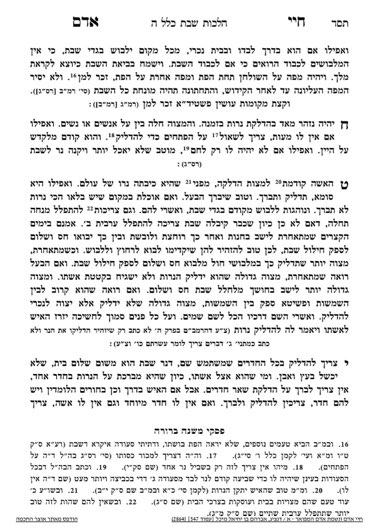We are continuing with a background to siman 10. We learned that the chiyuv of hadlakas neiros is both a chovas habayis and chovas haguf, and that once one family member makes a bracha in the home, it covers other lights put on in the home as well, even by other family members. We left off discussing other places, outside of the home, in which family members will be over Shabbos, including when they are guests.
When one will not be home over Shabbos, and is invited as a guest to eat at someone’s home, they are included in the hadlakah of the family. If they are staying in their own room, they have a chiyuv to ensure there is sufficient light in their room, and they would make a bracha on the lights in their room.
Regarding neiros Chanukah, we know there is a concept of being mishtateif b’perutah, joining into the lighting of one’s host with a small amount of money. Regarding neiros Shabbos, it will apply when an individual is a guest at someone else’s house, but is eating their own food. If they have their own room, they would light in their own room. If he eats at the same table as the host, he is chayav to join into the host’s neiros. In this case, he is semi-dependent on the host, because he is eating his own food but eating at the host’s meal. In such a case, he joins with a perutah. The guest does not need to actually give a perutah, as the host can give him a kinyan in a part of the neiros without any cash exchanged.
If one pays for their food, but the language of the arrangement for the food is such that the payment includes all food-related needs, the payment given for the food is considered payment for joining in the neiros, because he needs the joining in order to eat over Shabbos.
The only cases of being mishtateiph b’perutah are like the above case, where the guest is eating from his own food. The mechanics of being mishtateif b’perutah are complicated.
The poskim discuss businessmen traveling to fairs. The Jewish businessmen would go to these fairs, and buy and sell until they made a profit. Multiple people would share a room in order to save money. The question comes up regarding Shabbos. If the owner is Jewish, and they join him for the meals, they would be yotzei through the owner’s lighting. If they are paying for their meals, they are yotzei through the money paid for the meals (assuming they ensure the language of the payment includes all food-related expenses).
If there is no owner (e.g, the owner is not there over Shabbos), they should all join together b’perutah and one individual should light on behalf of everyone else. This is different from a regular home, where the chovas habayis and chovas haguf join together, because over here there is clearly a chovas haguf on each individual person.
If each person wants to light on their own, it gets back to the machlokes between the Shulchan Aruch and Rema (S0131) as to whether one may light on their own once there is already illumination in the room. We will discuss the point further, be’ezras Hashem.
Summary
- If one is a guest over Shabbos, and they are eating their meals with their hosts, they are included in their host’s hadlakah.
- If they have their own room, they have a chiyuv to ensure there is sufficient light in their room, and would make a bracha on those lights.
- If one is a guest but is eating their own food, they are mishtateif b’perutah with the host.



